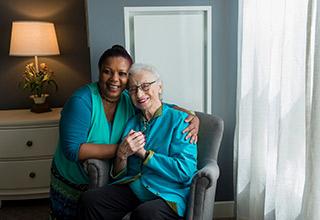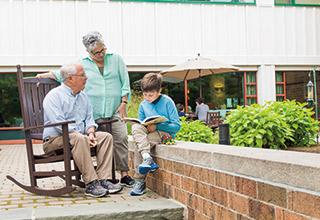Caring for an Older Parent When You Have a Strained Relationship
Learn how to prioritize your well-being when caring for a parent you have a difficult history with.

Family relationships aren’t always easy. That statement can ring especially true for adult children taking care of older parents, who may be navigating a complicated relationship with the parent they’ve chosen — or feel obligated — to support.
Strained relationships between adult children and parents can take many forms. You may frequently bicker or have an emotionally distant relationship with your parent, or be coping with a more serious history of unhealed trauma, neglect, or childhood abuse. Dementia caregivers often face unique challenges caused by memory loss.
A complex relationship with the parent you’re caring for can add significant stress to your life. Leaning into available resources or acknowledging that it’s okay to take a step back for your well-being can benefit both you and the parent you care for.
Caregiving for a parent when your relationship isn’t easy
If you have a painful history with your parent, you may experience a range of emotions when you decide to take on a caregiving role for them: guilt, anger, sadness, and hope, to name a few. As a social worker at Hebrew Rehabilitation Center, I’ve heard adult children express frustration around the sentiment, “They didn’t take care of me, and now I have to take care of them.”
If that’s the case for you, you’re not alone. In 2020, AARP estimated that 42 million U.S. adults care for someone age 50 or older. Most often, that care is provided to a relative, and usually that relative is a parent. Adult children don’t always feel like they have a choice before committing to providing care due to factors like finances, limited health care support, cultural norms, and familial expectations. But you may feel differently, seeing caregiving as an opportunity to reconcile with a parent despite a difficult history.
No matter your outlook, caregiving when your relationship has been strained isn’t always seamless. A study on caregiving for parents who caused harm found that those who experienced neglect or abuse as children report worse mental health than those who did not. Even if you simply don’t click with your parent, caregiving stressors can bring that tension to the surface. You might find it challenging to coordinate care for a parent you don’t enjoy spending time with.
You may find yourself trying to reconcile past conflicts while navigating caregiving duties in the present. That could mean working through emotions or pain with a mental health counselor, identifying resources to give yourself a break, or stepping back and finding alternative care options. Remember that support can still be meaningful even if you’re not directly involved in your parent’s day-to-day care. Every option is profoundly personal and completely valid.
Navigating a complicated relationship when dementia is involved
Dementia can add even more complexity to your relationship with your parent. A dementia diagnosis may mean there will come a time when your parent doesn’t remember your potentially painful family history. Additionally, they may display changes in their personality or behavior because of their diagnosis. Some people have healthy relationships with their parents, who later develop aggressive behaviors after a dementia diagnosis.
Remember that if caregiving feels like more than you bargained for, it’s okay to say “no” — even if feelings of guilt or obligation suggest that you don’t have a choice. If your parent can no longer make their own decisions and no one is willing to serve as their health care proxy, a professional guardian can be appointed to manage their care.
Finding support when caregiving feels heavy
While finding space for yourself may be challenging, carving out even a few minutes can make more of a difference than you think. Our blog post on practical self-care for caregivers offers tips that you may find useful, such as giving yourself a five-minute break or stepping outdoors to do some breathing while your parent is engaged in another activity.
If you have family support, initiating a conversation with your siblings about your older parent can be valuable. Caregiving often falls primarily on one child, even if more than one adult child lives close to their parents. In many families, daughters take on a disproportionate amount of the responsibility. Having honest conversations with your siblings about the support you need from them may allow you to achieve more balance in your daily life. This might include setting up a caregiving schedule or discussing financial responsibilities. Additionally, you can tap into local resources.
Resources for caregivers in Greater Boston
There are numerous resources in the Greater Boston area that can offer relief and assistance:
- Massachusetts has dozens of private home care agencies that offer non-medical in-home care.
- A life care manager, or geriatric care manager, can help you keep track of medical appointments, provide transportation, access resources like home health aides, and find the right services and programs to relieve caregiving stressors.
- The Program of All-Inclusive Care for the Elderly, or PACE, is a Medicare and Medicaid program that helps people meet their health care needs within the community rather than in a nursing home or other long-term care facility.
- Your local Council on Aging can connect you with support, local outreach, social and health services, and other resources unique to your situation and financial needs.
- Hebrew SeniorLife’s Deanna and Sidney Wolk Center for Memory Health offers multiple resources for caregivers of people with dementia, including support groups, caregiver education, and in-home respite care.
Learn about more resources that can help connect older adults with social supports and non-medical care.
You may decide to create distance in your relationship with your parent. At the same time, you may still want to ensure that they’re cared for and safe. Facilitating care through these resources is one way you can help support them.
Remember that while you can set boundaries around personal involvement, you can’t force your parent to accept care they don’t want. However, that advice likely does not apply if you are the designated health care proxy and it has been enacted. If that is the case, you are likely making decisions on your parent’s behalf based on both their care needs and their previously expressed wishes.
Getting support for your mental health
If you become overwhelmed, you may feel burned out from your caregiving duties. Burnout differs from stress because it happens when you reach the point where you feel like you have nothing left to give. You may feel physically or emotionally exhausted, and it could affect your quality of life and the care you give.
Mental health support is often crucial for caregivers. If you experience burnout or are working through unresolved feelings about your relationship with your parent, seeking help — either through private therapy, a support group, or a combination of supports — could be especially helpful in regaining a sense of control.
No one should have to navigate caregiving alone; we need systems that support us as we age in order to thrive. One comprehensive review found that caregivers who provide at-home care for older people with dementia who attended support groups gained positive emotional support, a means of venting negative feelings, and a way to address everyday care issues. Whether you’re coping with the past, caregiver fatigue, or just want someone to talk to, there are resources out there — and you deserve to have an outlet.
Caregiver support at Hebrew SeniorLife
Hebrew SeniorLife is here to support caregivers and older adults through all stages of their care needs. With a range of senior living, health care, and in-home services in Greater Boston, we can help you find solutions allowing your parents to live their best lives. The Wolk Center for Memory Health also offers caregiver-specific services, including support groups, caregiver education, and innovative in-home respite care.
Interested in exploring your options? Find a service or community today to learn more.
Blog Topics
Learn More
Wolk Center for Memory Health
The Deanna and Sidney Wolk Center for Memory Health at Hebrew SeniorLife provides outpatient memory care services, in person and virtually, for people living with cognitive symptoms — and for their families and caregivers.

Senior Living
Hebrew SeniorLife offers a variety of senior living options, including independent living, assisted living, and enhanced living. There are options for every lifestyle and budget.




